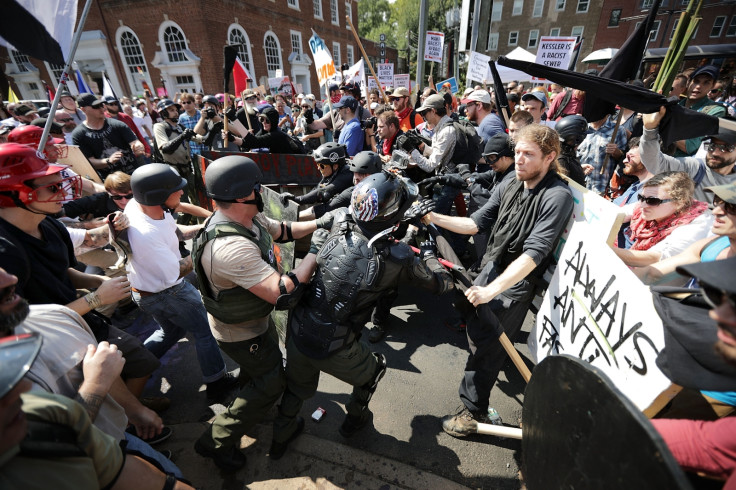'Horseshoe theory' is nonsense – anti-fascists and neo-Nazis are not the same
Hysterical horseshoe theorists claim moral equivalence between socialism and fascism, Marx and Hitler.
"The Nazis and the Bolshies have signed a non-aggression pact. At least it isn't signed yet, it's only just been announced."
And so the 'midnight of the century' was introduced by the buttoned-up old clerk Mr Josser in London Belongs to Me, Norman Collins' epic novel about life in England's capital on the eve of the Second World War.
The story itself dwelt on the reaction of 'ordinary people' to the onset of war. Readers were left only to imagine the ideological contortions that many a faithful communist must have been going through at about the same time.
We of course do not really have to imagine anything: there are numerous historical testimonies from both those who ran from communism like it were a disturbed nest of hornets, as well as from those who doubled-down faithfully for the two years of the pact's existence.
For a short period of time – until the Wehrmacht launched Operation Barbarossa on 22 June 1941 – there existed a grim symbiosis between two ideologies which had until then squared off as bitter foes.
Until Ribbentrop had landed in Moscow to discuss with Joseph Stalin the defenestration and annexation of Poland, to be a German Nazi was to believe primarily in a civilisational mission to rid the world of 'Judeo-Bolshevism', whereas to be a communist was to be implacably hostile to fascism. Or at least that was true on the face of things.
The Nazi-Soviet pact – as well as the brutal similarities between Hitlerian fascism and Stalinist communism – led many to view 'totalitarianism' as a unique phenomenon. Once you looked up close – 'from man to pig, and from pig to man again' – the similarities seemed to overwhelm any nominal differences. And that called for a certain response.
As Julius Jacobson asked penetratingly of his left-wing comrades in 1983: "Is a Cuban gendarme, humiliating homosexuals as he herds them through public avenues en route to a 'rehabilitation' centre, more acceptable than his fascist counterpart because he is decked out in a Guevara beret?"
But a healthy suspicion of totalitarianism has subsequently morphed for some into a clever-seeming squaring of the circle. This particular strain of pseudo-cleverness goes under the name of "horseshoe theory", and is built on the notion that far-left and far-right, rather than being opposite ends of a political spectrum, closely resemble each other, rather like the ends of a horseshoe.
Its exponents might be defined more by temperament than by a tightly-bound set of beliefs, but they put great stock in the fact that they are willing (with great courage, you understand) to turn their guns (or at least their furrowed brows) in the direction of anything which strays even an inch or two beyond this soggy middle.
Thus a few weeks ago in the Washington Post, the former George W. Bush speechwriter Marc Thiessen described anti-fascist protesters as the "moral equivalent of neo-Nazis". Similarly, in a defence of 'centrism' billed as the 'moderate manifesto' for the online magazine Quillette, Bo Winegard cautioned readers that the "ugliness and extremism on display in Virginia should not provoke blind praise for equally extreme movements on the Left".

A few days after Winegard's piece appeared, the Guardian writer Abi Wilkinson wrote on Twitter that Marxism was morally superior to Hitlerian fascism. Responding to Thiessen's comments, Wilkinson wrote that there was "a difference between an ideology that's genocidal and one that's based on idea of equality". And of course, as this offended the central pillar of horseshoe theory, Wilkinson was predictably subjected to a barrage of online abuse.
Part of the twentieth century tragedy as it relates to socialism (and part of the reason Wilkinson is right and her interlocutors wrong) has its basis in the fact that one can impugn regimes which claimed to speak in the name of socialism precisely on the grounds that they failed to meet the standards laid down by the movement's progenitors. You cannot after all betray a revolution if there was nothing worth preserving in the idea of revolution in the first place.
Notice that this does not prevent one from believing that such a cause was rigged up for catastrophe from the start. But the horseshoe theorists make a much larger claim, and imply a moral equivalence between socialism and fascism tout court and at source. A well-thumbed copy of Marx is, they maintain with an air of hifalutin moral certainty, on a par with Mein Kampf or the work of some disgusting fraud like David Irving.
Any sarcastic enquiry as to the whereabouts of, say, the Strasserite Animal Farm, or the version written in Spanish by the disgruntled general of Augusto Pinochet, is of course met with stony-faced silence. This is especially true when you ask to be pointed toward the Brown Shirt equivalent of a Victor Serge or an Andreas Nin - or even an Eric Blair.
The merest possibility that fascism might have turned out better given more propitious circumstances is ridiculous, even to the sorts of equivocators who take the horseshoe theory seriously.
Yet a part of me suspects that to pursue this argument at all is to take things too seriously. The endless denunciations of 'all sides' (and not only the fellow travelling denunciations of 'all sides') smacks of a concerted effort to discredit the socialist left in the way that, say, fascism is discredited on the right (or at least was until the ascendancy of Donald Trump). Horseshoe theory is premised on the hysterical – as well as conceited – notion that anything which diverges from the 'centre' is invariably born of the same parent.

The never-ending hunt for 'sameness' in one's opponents is also as much an attempt to stop thinking as the most rigid and doctrinaire communist's fealty to his sacred texts. When everything you don't like is the same, you needn't bother with the intellectual leg-work required to make mature distinctions.
It is an unusual moral juncture to have arrived at when the supposed 'centre' is ready to portray anti-fascists including anarchists, Trotskyists, and democratic socialists - many of whose antecedents historically suffered more than most under Stalinist regimes - as 'equally extreme' and the 'moral equivalents' of white supremacists.
It is especially weird when the latter are in the ascendancy again thanks to the complete implosion of that same 'vital centre' – Bill, George, Barack and Hillary – that the left is glibly admonished to embrace by the horseshoe crowd.
The whole sorry brouhaha brings to mind a saying attributed (falsely, I suspect) to Oscar Wilde: "Everything in moderation, including moderation."
© Copyright IBTimes 2025. All rights reserved.






















